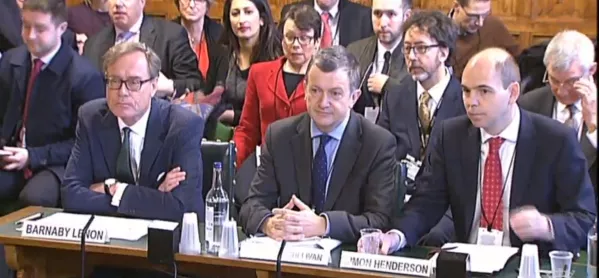- Home
- Assessment: The ‘worrying’ rise in exam malpractice - and four other trends discussed by experts today
Assessment: The ‘worrying’ rise in exam malpractice - and four other trends discussed by experts today

Senior education figures were questioned by MPs on assessment this morning, following allegations of exam leaks this summer. Here are five areas covered during the education committee meeting.
1. Teachers are ‘likely’ to be allowed to continue teaching exams that they write
Exams regulator Ofqual has been calling for evidence about serving teachers who set exam papers, following claims some have leaked questions to their students.
Eton College’s deputy headmaster left the school amid claims he leaked questions from a Pre-U economics exam following an investigation by the Cambridge International Examinations (CIE).
One of the options on the table is allowing teachers to continue setting exams but not allowing them to teach the specification that they are writing.
Speaking to the education select committee today, Michelle Meadows, Ofqual’s executive director for strategy, risk and research, said: “We haven’t ruled that out. But there are some really thorny issues associated with that.”
She said that it was “more likely” that they would allow teachers to continue to teach the specification that they have been written papers for.
Ms Meadows added: “But they won’t know with certainty when the question or papers they have been working on will come up.”
2. Eton College keeps pupils in the dark over which teachers set exams
Simon Henderson, the head of Eton College, said the school has introduced additional safeguards following the leaked exams this summer.
He said: “We have now said that teachers are not to disclose to pupils if they are involved in examining because we think that perhaps puts an additional risk if the pupils know.
Mr Henderson told MPs today that eight teachers at the school are involved in setting exams for 10 separate exams - and seven of these exams are papers that pupils at Eton sit.
3. Malpractice has risen by 167 per cent in five years at one exam board
When asked by MPs for the number of cases of exam malpractice, Michael O’Sullivan, the chief executive of Cambridge Assessment International Education, said worldwide there were 719 cases this year.
And the number of cases of exam malpractice in the UK would have been “in the dozens” each year.
Mr O’Sullivan said there had been 269 proven cases of exam malpractice in 2013 - a rise of 167 per cent in five years.
Robert Halfon, chair of the education select committee, called the trend “pretty worrying”, but Mr O’Sullivan said he believed the rise could be attributed to more schools and candidates taking exams.
Last year, Ofqual published figures for some exam boards, which did not include Cambridge Assessment International Education, showing that the number of penalties given to school and college staff for exam malpractice had climbed by 48 per cent in a year.
4. Ofqual is aware of ‘a whole range of pressures’ on teachers to produce good exam results
Ms Meadows said Ofqual’s call for evidence on setting exam papers had shown a fifth of respondents had “spontaneously” talked about pressures on teachers.
She said: “Our respondents talked about pressures from the accountability system, pressures from parents, pressures from senior management. A whole range of pressures they experience.
“Nonetheless the majority do act with integrity.”
But the headmaster of Eton College insisted today that he does not put pressure on the school’s teachers to improve exam results.
Asked by the committee if the “high stakes accountability” of the examinations system leads to teachers feeling under pressure to get results by any means, Mr Henderson said: “That’s certainly a question I’ve asked myself over the last few months. In the case of my school, I don’t believe that to be the case.
“We pride ourselves that the education we offer is about much more than just examination results.”
He added: “I don’t know why this particular teacher behaved in this way, but I will come back to the fact that his own colleagues were the ones who reported it.”
Speaking today, Jo-Anne Baird, director of the Department of Education at Oxford University, said: “We have got to be very careful about the pressures that are put on teachers and the sorts of unintended consequences that these pressures can result in.”
5. One per cent of pupils at independent schools pay no fees
Barnaby Lenon, the chair of the Independent Schools Council (ISC), told the committee that last year around 6,000 pupils at ISC school paid no fees out of a total of half a million pupils - 1 per cent of the cohort.
When asked how many of the 6,000 pupils would have come from the most socially disadvantaged homes, Mr Lenon said “they would all be in that category”.
He added: “A third of our pupils are on some sort of fee reduction, but where the line would be drawn for free school meals is something we would have to look at.”
At today’s committee, Mr Henderson said that 261 Eton pupils had had “some form of financial support” in the last academic year - around 20 per cent of the pupil body.
Of the 261 getting help last year, 82 received a 100 per cent bursary. He said: “The majority of those would, I believe, qualify for free school meals.”
Want to keep up with the latest education news and opinion? Follow Tes on Twitter and Instagram, and like Tes on Facebook
Keep reading for just £1 per month
You've reached your limit of free articles this month. Subscribe for £1 per month for three months and get:
- Unlimited access to all Tes magazine content
- Exclusive subscriber-only stories
- Award-winning email newsletters



